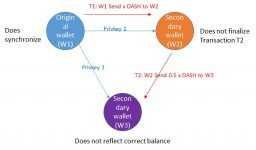aka teslaalset
New member
Using QT wallet and exporting privkey to an unused QT Wallet on another PC, the new wallet's DASH credit does not reflect the wallet's credit that I exported the privkey from. The 'clone' wallet shows many spend transitions while I did not manually initiate these.
This may be due to the fact that I exported the privkey from my original wallet while not finializing a mixing action (PrivateSend state at 20%).
I retried this action after I finished a mixing options ( PrivateSend state indicated 100%), but no improvements achieved.
Any clue on how to get my clone wallet in sync again with the original wallet?
This may be due to the fact that I exported the privkey from my original wallet while not finializing a mixing action (PrivateSend state at 20%).
I retried this action after I finished a mixing options ( PrivateSend state indicated 100%), but no improvements achieved.
Any clue on how to get my clone wallet in sync again with the original wallet?

